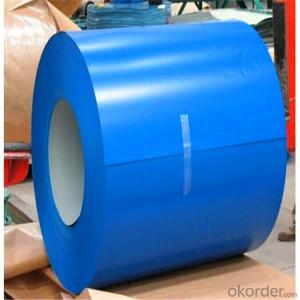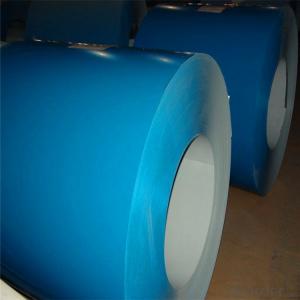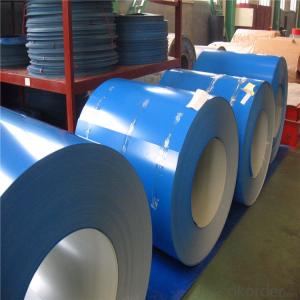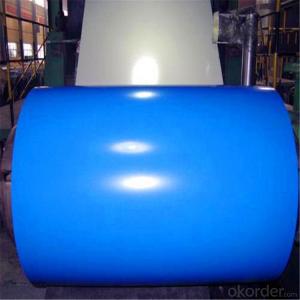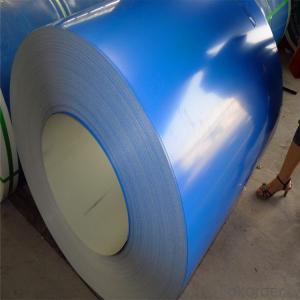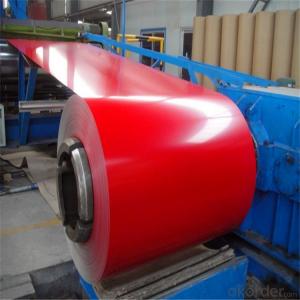Ral 9014 PPGI for Exporting Construction
- Loading Port:
- Tianjin
- Payment Terms:
- TT or LC
- Min Order Qty:
- 25 m.t.
- Supply Capability:
- 5000 m.t./month
OKorder Service Pledge
OKorder Financial Service
You Might Also Like
Item specifice
Ral 9014 PPGI for Exporting
Description of Ral 9014 PPGI for Exporting
Product | PPGI/PPGL |
Capacity | 5,000 tons/month |
Base material | Hot dipped galvanized steel |
Thickness | 0.2-2.0mm |
Width | 600-1250mm(according to your need) |
Coil Weight | 3-6tons |
Quality | SGCC, DX51D |
Color | RAL No. or customers samples’ color |
Zinc-coating | 30g/m2-180g/m2 |
Coil ID | 508mm/610mm |
Technique | Cold rolled—hot dipped galvanized—color coated |
Painting | Top painting:15~25μm |
Back painting: 6~10μm | |
Tolerance | Thickness: +/-0.02mm |
Width:+/-2mm | |
Shipment time | within 15-45 workdays |
Payment | T/T, L/C at sight |
Packing | Standard export packing |
The special order can be negotiated. | |
Application of Ral 9014 PPGI for Exporting
APPLICATION OF OUR PREPAINTED STEEL | ||||||||||
Construction | Outside | Workshop,agricultural warehouse,residential precast unit | ||||||||
corrugated roof,roller shutter door,rainwater drainage pipe,retailer booth | ||||||||||
Inside | Door,doorcase,light steel roof stucture,folding screen,elevator,stairway,ven gutter,Construction Wall | |||||||||
Electrical applicance | Refrigerator,washer,switch cabnet,instrument cabinet,air conditioning,micro-wave owen,bread maker | |||||||||
Fuiniture | Central heating slice,lampshade,chifforobe,desk,bed,locker,bookself | |||||||||
Carrying trade | Exterior decoration of auto and train,clapboard,container,isolation lairage,isolation board | |||||||||
Qthers | Writing panel,garbagecan,billboard,timekeeper,typewriter,instrument panel,weight sensor,photographic equipment | |||||||||
Products Show of Ral 9014 PPGI for Exporting

Product Advantages
1.With nearly 20 years experience in prepainted steel, accommodate different marketdemands. | ||||||||||||||
2.'Quality first, service first' is our business aim; 'The good faith get respect,cast quality market' is our Business philosophy . | ||||||||||||||
3.Having two series producttion line,with the abbual production capacity of 240000 tons. | ||||||||||||||
4.Exceed International ISO9001:2008&ISO14001:2004 quality and environmental standards | ||||||||||||||
5.Meet with ROHS standard |
Company Information
CNBM International Corporation is the most important trading platform of CNBM group.
Whith its advantages, CNBM International are mainly concentrate on Cement, Glass, Iron and Steel, Ceramics industries and devotes herself for supplying high qulity series of refractories as well as technical consultancies and logistics solutions.


F A Q
1, Your advantages?
professional products inquiry, products knowledge train (for agents), smooth goods delivery, excellent customer solution proposale
2, Test & Certificate?
SGS test is available, customer inspection before shipping is welcome, third party inspection is no problem
3, Factory or Trading Company?
CNBM is a trading company but we have so many protocol factories and CNBM works as a trading department of these factories. Also CNBM is the holding company of many factories.
4, Payment Terms?
30% TT as deposit and 70% before delivery.
Irrevocable L/C at sight.
5, Trading Terms?
EXW, FOB, CIF, FFR, CNF
6, After-sale Service?
CNBM provides the services and support you need for every step of our cooperation. We're the business partner you can trust.
For any problem, please kindly contact us at any your convenient time.
We'll reply you in our first priority within 24 hours.
- Q:What are the common challenges in heat treatment of special steel?
- To achieve the desired material properties, careful attention must be given to several challenges encountered in the heat treatment of special steel. One primary challenge revolves around the necessity for meticulous temperature control throughout the heating and cooling stages. Special steels typically have specific temperature ranges for heat treatment that must be strictly adhered to in order to attain the desired microstructure and mechanical properties. Failing to maintain precise temperature control can result in inadequate or inconsistent heat treatment, ultimately leading to suboptimal material performance. Another challenge lies in the potential distortion or warping of the steel components during the heat treatment process. Special steels often possess intricate designs or complex shapes, making them more susceptible to distortion when subjected to high temperatures. This distortion can have adverse effects on the overall quality and dimensional accuracy of the final product. Consequently, careful consideration must be given to the selection of suitable heating and cooling methods, as well as the utilization of fixtures or jigs to minimize distortion. Moreover, special steels may contain alloying elements that significantly influence the heat treatment process. Elements like chromium, molybdenum, or vanadium can alter the steel's hardenability, tempering response, or transformation behavior. Their presence can introduce additional challenges when determining the optimal heat treatment parameters, necessitating adjustments to heating and cooling rates, soak times, or quenching media. Lastly, achieving uniformity in heat treatment across a batch of special steel components can prove to be challenging. Variations in size, shape, or composition within a batch can result in inconsistent heat treatment outcomes. Controlling the heating and cooling rates, ensuring proper circulation of the heat treatment media, and implementing effective process monitoring techniques are essential in achieving consistent and uniform material properties. In conclusion, the heat treatment of special steel encompasses challenges such as precise temperature control, distortion/warping, the influence of alloying elements, and achieving uniformity across a batch. Successfully addressing these challenges requires a comprehensive understanding of the steel's composition, meticulous process planning, and the utilization of appropriate process controls and monitoring techniques.
- Q:How does special steel perform in marine environments?
- Special steel is specifically designed to withstand the harsh conditions of marine environments. It offers superior corrosion resistance, high strength, and excellent durability, making it highly suitable for applications in marine settings. This type of steel can effectively resist the corrosive effects of saltwater, moisture, and other environmental factors, ensuring long-term performance and reducing maintenance requirements.
- Q:How does stainless steel contribute to the construction industry?
- Stainless steel contributes to the construction industry by providing durability, corrosion resistance, and aesthetic appeal. It is widely used in structural applications, such as building facades, bridges, and roofing, as it can withstand harsh weather conditions and maintain its strength over time. Stainless steel's resistance to corrosion also makes it a suitable choice for plumbing, electrical, and HVAC systems, ensuring longevity and minimizing maintenance. Additionally, its sleek and modern appearance enhances the overall aesthetics of architectural designs.
- Q:What are the properties of magnetic alloy steel?
- Magnetic alloy steel possesses magnetic properties due to its composition of iron and other elements such as nickel, cobalt, and chromium. These alloys are known for their high magnetism, excellent strength, and resistance to corrosion. They have a wide range of applications in industries like electrical engineering, automotive, and aerospace, where their magnetic properties are crucial for tasks like generating and directing magnetic fields, magnetic shielding, and producing high-performance magnets.
- Q:What are the main characteristics of alloy steel forgings?
- Alloy steel forgings possess several key characteristics that make them highly desirable in various industries. Firstly, alloy steel forgings are known for their exceptional strength and durability. The inclusion of different alloying elements, such as chromium, nickel, molybdenum, and vanadium, enhances the steel's mechanical properties, making it resistant to wear, fatigue, and corrosion. Another important characteristic of alloy steel forgings is their versatility. These forgings can be customized to meet specific requirements, whether it be in terms of shape, size, or performance. This adaptability allows for the production of complex and intricate components that are often used in critical applications, such as aerospace, automotive, and oil and gas industries. Additionally, alloy steel forgings exhibit excellent heat resistance and can withstand extreme temperature fluctuations without losing their structural integrity. This property is particularly beneficial in applications where components are exposed to high temperatures or rapid temperature changes, such as gas turbines, boilers, and heat exchangers. Furthermore, alloy steel forgings offer superior machinability and weldability, making them easier to work with during the manufacturing process. This characteristic allows for precise shaping, forming, and machining of the forgings, enabling manufacturers to achieve intricate designs and tight tolerances. Lastly, alloy steel forgings are known for their cost-effectiveness. Despite their exceptional properties, alloy steel forgings can be produced in large quantities, resulting in economies of scale. This makes them a cost-efficient choice for various industries looking to balance performance, durability, and affordability. In summary, the main characteristics of alloy steel forgings are their exceptional strength, durability, versatility, heat resistance, machinability, weldability, and cost-effectiveness. These qualities make alloy steel forgings a preferred choice for applications requiring high-performance components that can withstand challenging conditions.
- Q:What is the significance of alloying elements in special steel?
- The significance of alloying elements in special steel is that they enhance the properties and performance of the steel. These elements are added in varying proportions to achieve desired characteristics such as increased strength, improved corrosion resistance, enhanced hardness, better heat resistance, or increased toughness. Alloying elements also play a crucial role in controlling the grain structure, reducing brittleness, and improving the overall mechanical properties of the steel. Thus, alloying elements are essential in tailoring the steel's properties to meet specific industrial applications and requirements.
- Q:Can special steel be used in mining applications?
- Yes, special steel can be used in mining applications. Special steel, also known as alloy steel, is specifically designed to have enhanced properties such as increased strength, durability, and resistance to wear and corrosion. These properties make it highly suitable for various mining applications where the equipment and machinery are subjected to extreme conditions, including heavy loads, abrasive materials, and exposure to water or chemicals. In mining, special steel is commonly used for manufacturing drill bits, cutting tools, crushing and grinding equipment, conveyor belts, and structural components of mining machinery. For example, drill bits made from special steel alloys have improved hardness and toughness, allowing them to effectively penetrate hard rock formations. Similarly, crushing and grinding equipment that utilizes special steel components can withstand the high stress and impact forces encountered during the extraction and processing of minerals. Moreover, special steel alloys provide better resistance to corrosion and wear, which are common challenges in mining environments. This helps to extend the lifespan of mining equipment, reduce maintenance costs, and enhance operational efficiency. Additionally, special steel can be tailored to meet specific requirements, allowing manufacturers to optimize the performance of mining equipment for different mining applications and conditions. Overall, the use of special steel in mining applications offers numerous benefits in terms of improved performance, durability, and cost-effectiveness. Its unique properties make it an essential material in mining operations, enabling the extraction and processing of minerals in a more efficient and sustainable manner.
- Q:How does special steel contribute to the performance of cutting tools?
- The performance of cutting tools is greatly enhanced by special steel, which possesses a variety of advantageous properties. To begin with, the utilization of special steel in the manufacturing of cutting tools offers remarkable hardness. This hardness enables the tool to endure high levels of stress and wear, ensuring that the cutting edge remains sharp for an extended period. As a result, cutting efficiency and precision are improved. Furthermore, special steel is renowned for its outstanding toughness and resistance to chipping and breaking. This characteristic is crucial in cutting tools as it allows them to withstand the powerful forces and vibrations generated during the cutting process. The toughness of special steel ensures that the tool can withstand these extreme conditions without compromising its performance or structural integrity. Moreover, special steel provides excellent resistance to heat and temperature stability. When engaged in cutting operations, the tool can generate substantial amounts of heat due to friction. Special steel's capacity to resist thermal deformation and maintain its hardness at high temperatures prevents the cutting edge from losing its effectiveness or becoming dull. Additionally, special steel can be customized to suit specific applications through alloying and heat treatment procedures. This adaptability allows manufacturers to optimize the steel's properties based on the intended use of the cutting tool, such as cutting different materials or operating in challenging environments. By tailoring the special steel, cutting tools can be designed to provide optimal performance, durability, and longevity. In conclusion, special steel significantly contributes to the performance of cutting tools by offering exceptional hardness, toughness, heat resistance, and customization options. These properties guarantee that cutting tools remain sharp, durable, and efficient, enabling them to achieve precise cuts and endure demanding cutting operations.
- Q:How is special steel manufactured?
- Special steel is manufactured through a complex process that involves melting, refining, and shaping steel with precise chemical compositions and desired properties. This may include alloying steel with various elements, such as chromium, nickel, or molybdenum, to enhance its strength, corrosion resistance, or heat resistance. The steel is then formed into desired shapes through techniques like rolling, forging, or casting. The manufacturing process also involves strict quality control measures to ensure the final product meets the specific requirements of various industries, such as automotive, aerospace, or construction.
- Q:What are the requirements for special steel used in defense equipment manufacturing?
- The requirements for special steel used in defense equipment manufacturing typically include high strength and durability, resistance to corrosion and wear, good toughness and impact resistance, as well as the ability to withstand extreme temperatures and harsh environments. Additionally, the steel must meet stringent quality control standards and industry specifications to ensure its reliability and performance in critical defense applications.
1. Manufacturer Overview |
|
|---|---|
| Location | |
| Year Established | |
| Annual Output Value | |
| Main Markets | |
| Company Certifications | |
2. Manufacturer Certificates |
|
|---|---|
| a) Certification Name | |
| Range | |
| Reference | |
| Validity Period | |
3. Manufacturer Capability |
|
|---|---|
| a)Trade Capacity | |
| Nearest Port | |
| Export Percentage | |
| No.of Employees in Trade Department | |
| Language Spoken: | |
| b)Factory Information | |
| Factory Size: | |
| No. of Production Lines | |
| Contract Manufacturing | |
| Product Price Range | |
Send your message to us
Ral 9014 PPGI for Exporting Construction
- Loading Port:
- Tianjin
- Payment Terms:
- TT or LC
- Min Order Qty:
- 25 m.t.
- Supply Capability:
- 5000 m.t./month
OKorder Service Pledge
OKorder Financial Service
Similar products
New products
Hot products
Related keywords
